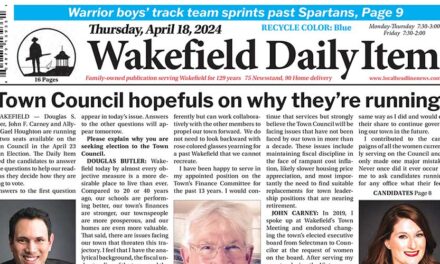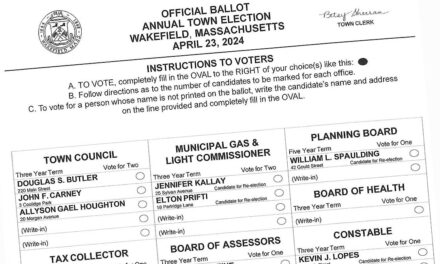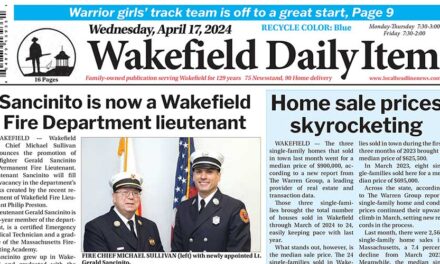By MARK SARDELLA
WAKEFIELD — The Board of Selectmen last night reacted to the report of the School Facilities Task Force, which over the last nine months has looked at how the town’s school buildings are maintained and recommended changes in the way that maintenance is currently handled. Task Force Chairman Chip Tarbell presented the panel’s findings to the School Committee on Aug. 26 and last night reviewed the report for the selectmen.
The report outlines specific problems at various school buildings, from heating and ventilation issues at the Dolbeare School to deficient science classrooms at the High School. Tarbell said that the Task force traced the root of the maintenance problem back to the town charter, which turned major responsibility for maintenance of school buildings over to the DPW, but offered “very little guidance” beyond that.
As a result, Tarbell said, the schools handle everyday cleaning and janitorial functions, but the charter gave the DPW responsibility for maintenance of all town-owned buildings, grounds and facilities (excluding libraries and the facilities of the WMGLD).
This bifurcation of responsibilities has resulted cumbersome communications as well as complications when it comes to whose budget pays for what, according to the report.
Tarbell said that the Task Force found that a lot of preventive maintenance wasn’t getting done in the schools and blamed some of the problems on issues related to training and supervision.
The Task Force also noted a number of capital improvement needs, concluding that the High School is in need of a major renovation. The group also recommended that the Greenwood and Walton schools be combined creating a third elementary school equal to the Woodville and the Dolbeare. The Task Force called for funding for school buildings to be a priority given the percentage of the town’s assets that they represent.
The panel further recommends that the Town Administrator and Superintendent of Schools establish a committee to coordinate and approve all indoor and outdoor facility functions, review the current management system (DPW and School) and create a detailed review of how the system can be combined to act as one.
The Task Force also urges the town to fund a feasibility study to look at the needs of the High School. This study would be the first step to developing a plan for the renovation and funding of a major rehabilitation and addition to the existing High School.
Finally, the panel concluded that the Town needs to fund a feasibility study to examine the location and size of the combined Greenwood and Walton schools.
Reaction from members of the Board of selectmen was mixed.
Selectman Phyllis Hull said that she agreed with a lot that was in the report. “But people can’t afford all these things,” she maintained, insisting that “We brought this on ourselves.” For that reason, she said that she wouldn’t go along with spending a lot of money on the school facilities. She said that she did not want to see taxes raised for new schools.
When it comes to maintaining town buildings, Hull said, “We don’t know how to do it.” She recommended that the town outsource its building maintenance.
Selectman Patrick Glynn said that he agreed with Hull to a degree, admitting there were deficiencies now that were “inexcusable.” Whether the solution was training or management restructuring, Glynn said that standards needed to be raised for the people responsible for doing the work. He also cited a need to give someone autonomy to handle all building maintenance.
Tarbell said that he agreed with some of Hull’s points about cleaning and other issues at the High School. The report, he told her, simply recommended looking at the High School to determine how best to spend the town’s money. Tarbell also said that the town could look at a cost/benefit analysis of outsourcing maintenance.
Glynn said that there were pluses and minuses to outsourcing maintenance, adding that “You get more ownership and dedication from local people.”
Tarbell maintained that the town needed to create a facilities department under the DPW that would manage all town buildings, including janitorial and major maintenance. Under the current system, he said, there is “too much time wasted deciding whose job it is.” He acknowledged that everyone “does the best they can,” but pointed to the inherent difficulty of “working under two different masters.”
Town Administrator Stephen P. Maio said that he would take the next step and that he and School Superintendent Dr. Stephen Zrike would put together a committee to come back with a comprehensive report. He said that he would like the committee to include citizens and to be co-chaired by DPW Business/Operations Manager Carol Antonelli and School Business Administrator Michael Pfifferling.




